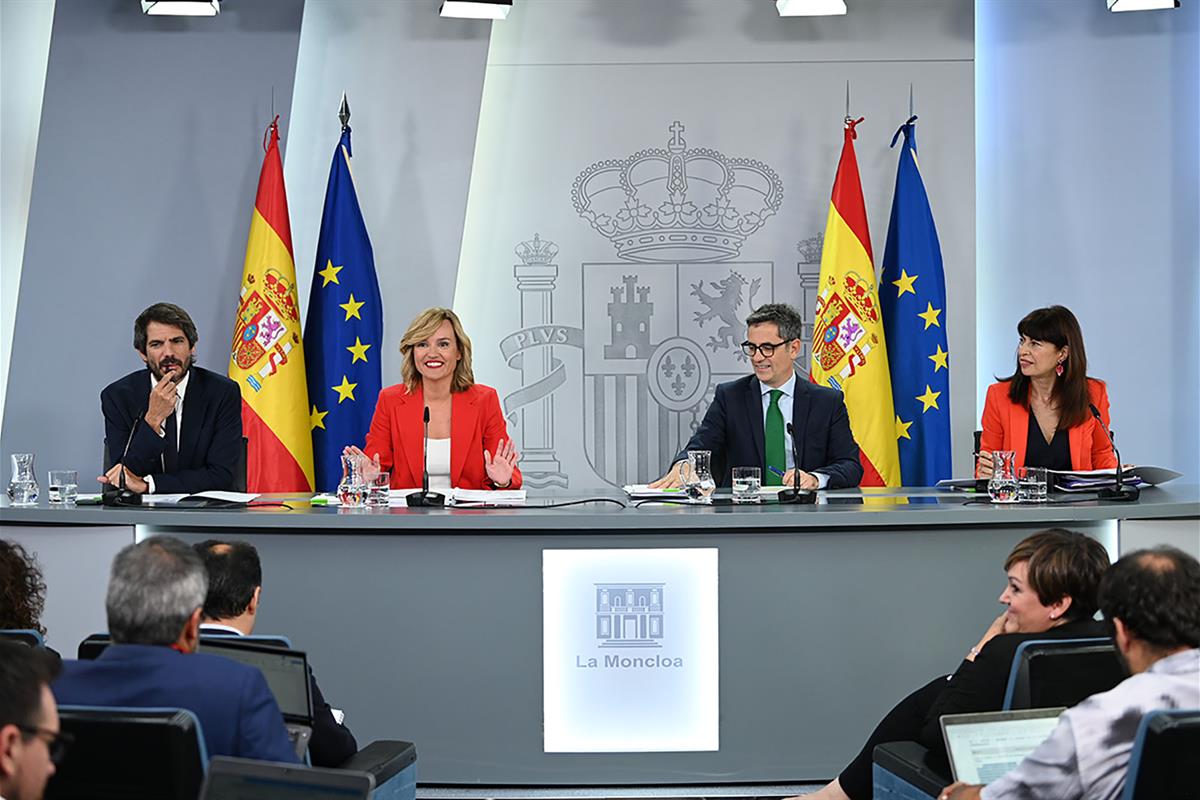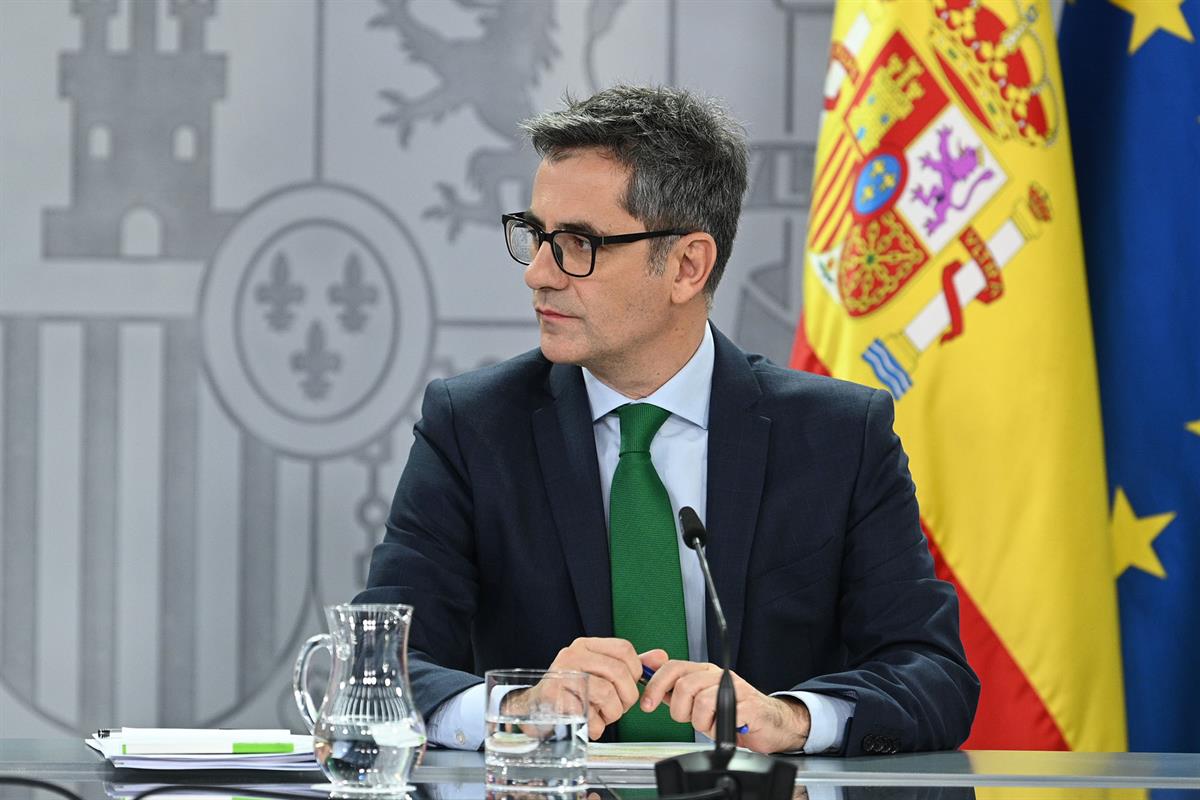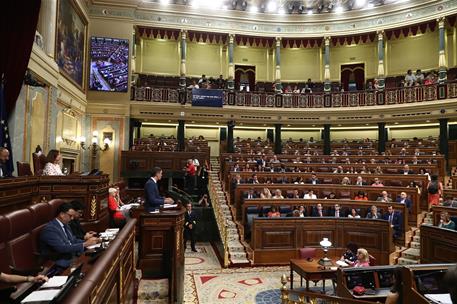Council of Ministers
The Government of Spain presents the Action Plan for Democracy to strengthen transparency, pluralism and the right to information
Council of Ministers - 2024.9.17
Moncloa Palace, Madrid
 Pool Moncloa /Borja Puig de la Bellacasa
Pool Moncloa /Borja Puig de la Bellacasa
The Minister for the Presidency, Justice and Parliamentary Relations, Félix Bolaños, has explained that the Action Plan for Democracy is a roadmap with 31 measures that the Government will implement over the next three years to "reinforce the cleanliness of our democracy and make the media ecosystem more transparent in order to guarantee truthful information".
In his opinion, Spain is a solid, full and strong democracy, but citizens perceive elements of erosion caused by disinformation and hoaxes. Therefore, the plan "seeks to fully restore confidence in democracy, to make it freer, cleaner" and to make the media more transparent.
Bolaños has indicated that the initiative has the Action Plan for European Democracy as a precedent, which was approved by the European Commission in 2020, and the European regulation on media freedom in 2023. Félix Bolaños assured that it is this European framework that the Executive is trying to implement "as successfully as possible". In addition, the Action Plan for Democracy includes various proposals made in July by some parliamentary groups during the meetings they held with the Government in the Lower House of Parliament.
The minister advanced that the plan is articulated in three axes, which include measures that will be promoted by different departments. An inter-ministerial commission will monitor its implementation.
First Axis: Expanding and improving the quality of government information
Pool Moncloa /Borja Puig de la Bellacasa
The Executive wants the institutions and the Government to have greater contact with citizens so that they can know and better understand all the public policies that are adopted to improve their living conditions, according to Bolaños. With the aim of improving transparency and accountability to citizens, the minister announced that a new strategy and the fifth Open Government Plan will be approved, and a draft Open Administration Law will be submitted to Parliament.
In addition, all governments will have to be accountable and inform citizens about their commitments and their degree of implementation, just as the current Executive has been doing since 2020.
The minister added that in order to strengthen the fight against corruption, the Executive will also create the Independent Authority for the Protection of Whistleblowers within the Public Administration. The plan also envisages reforming the pre-constitutional Official Secrets Act.
Second Axis: strengthening media transparency, plurality and accountability
Many of the measures in the second part of the plan aim to strengthen transparency and independence in the media. The Plan envisages the adaptation of Spanish legislation to comply with the provisions of the Regulation on Freedom of the Media, approved by the Council of the European Union and the European Parliament.
The Minister for Culture, Ernest Urtasun, has stressed that the initiative includes some of the most important demands of the last decade in relation to freedom of expression. It also addresses the need for a "media policy" for the first time, which implies "developing a legal, juridical and regulatory framework that guarantees the right to plural, truthful and quality information".
Urtasun pointed out that, first of all, that it is necessary to establish the criteria that define a media outlet as opposed to other platforms "whose purpose is not to inform". To this end, a media register will be set up in which public information on media ownership and advertising investment will be made available. This register will be drawn up and overseen by an independent body, the National Markets and Competition Commission.
A second measure is the establishment of the duty of all public administrations to annually publish advertising investment, information that today "is either not presented or is done so opaquely", according to Urtasun. When the regulation is implemented, all public institutions should provide such information in a visible, clear and transparent manner.
Pool Moncloa /Borja Puig de la Bellacasa
The plan includes the reform of the Law on Institutional Publicity in two respects. On one hand, as already announced by the president of the Government of Spain, criteria of transparency, proportionality and non-discrimination will be introduced in the allocation of advertising; these will be drawn up on the basis of work with experts in the communications sector and also with the parliamentary groups. Moreover, the law will be amended to ensure that audience measurement systems comply with the principles of transparency, impartiality, inclusiveness, proportionality, non-discrimination, comparability and verifiability.
The aim in both cases, according to the Minister for Culture, is "to make the system for distributing institutional advertising fairer and to prevent public money from being used to finance pseudo-media that promote media intoxication and 'fake news'".
Protection of journalists
The plan also aims to promote a law on the professional secrecy of journalists as a legal guarantee to protect sources. "This means regulating or enforcing what is already provided for and recognised in Article 20 of the Spanish Constitution", Urtasun pointed out. In the same vein, a European directive is transposed to protect journalists from external harassment. The rule, the minister explained, allows judges to swiftly dismiss manifestly unfounded claims against journalists or human rights defenders.
In addition, following the coalition Government's agreement, the Public Security Law will be reformed to put an end to the sanctions that information professionals receive for carrying out their work when this involves covering the actions of the State Law Enforcement Forces and Agencies.
The plan also proposes a review of the regulatory framework to tackle media oligopolies and to limit the funding that administrations can devote to the media, in order to avoid media that are directly driven by them.
Three legislative reforms
 Pool Moncloa/Borja Puig de la Bellacasa
Pool Moncloa/Borja Puig de la Bellacasa
In this second axis, Félix Bolaños announced that the Government will amend the organic laws that regulate the right to honour and the right to rectification to "guarantee that the courts can give a swift and effective response to any defamation published by media or pseudo-media". The current regime protecting the honour of individuals and guaranteeing the right to rectification of untruthful information has become obsolete in the face of today's media ecosystem, he stressed.
In addition, the minister anticipated that a comprehensive reform of the Criminal Code will be carried out to address articles that may limit freedom of expression, among other cases when it refers to state institutions and religious sentiments: "The aim is to bring our Criminal Code into line with European Union law and the case law of the European Court of Human Rights".
Third Axis: strengthening the transparency of the legislature and the electoral system
The Action Plan for Democracy contemplates the obligation to hold the annual State of the Nation Debate which, according to Félix Bolaños, will entail "a reform of the Parliamentary Procedure Rules".
The plan also includes the reform of the Organic Law on the General Electoral System to make it compulsory for candidates to attend electoral debates during election campaigns.
"Citizens have the right to know the proposals of the various candidates in an electoral system and they have the right to confront them in this debate, on television, on the radio, or in whatever format is agreed upon", said Bolaños.
Surveys conducted during electoral periods will have to make the micro-data or datasheets public to ensure their reliability. The minister pointed out that "on occasions, the polls that are published in periods close to elections seem, rather than seeking to ascertain the state of opinion, to try to influence the state of opinion, and I believe that it is a measure of transparency, of guarantee, that the micro-data be known".
Moreover, the Government will push for the approval of a lobbying law, recommended by the European Union, and will reinforce the existing obligation for political parties to publish their accounts and for ministers to publish their declarations of assets and interests. "We are going to establish a penalty regime so that non-compliance with this obligation will have consequences", the minister said.
Combating the trafficking and sexual exploitation of women
Pool Moncloa /Borja Puig de la Bellacasa
On International Day against Sexual Exploitation and Trafficking of Women and Children on 23 September, the Government has approved an institutional declaration to reinforce its commitment to the eradication of all forms of violence against women.
At the press conference after the Council of Ministers, the Minister for Equality, Ana Redondo, presented a first draft of a macro-study on trafficking, sexual exploitation and prostitution of women in Spain. This is a pioneering quantitative study in Europe, based on prostitution or dating advertisement websites and the use of artificial intelligence, big data and cross-referencing of data through various methodologies.
The study puts the number of women in prostitution in Spain at more than 114,576, which is equivalent to 0.56% of all women of legal age. Of these, 92,496 would be at risk of trafficking, and the risk would be high for at least 9,000 women. By age, the majority of women in this situation are between 18 and 24 years old (28%) or between 25 and 36 years old (32%). In terms of origin, 51% are Latinas. By autonomous community, the highest rates of women in prostitution are found in the Balearic Islands, Catalonia and the Valencian Community.
"The study forces us to look sensitively towards a group that is suffering, whose fundamental rights are being violated day after day", said Ana Redondo. The minister defended the need to deepen the work that has been carried out in recent years to put an end to these abuses. In this sense, she pointed out that the Government hopes to definitively approve the anti-trafficking bill so that it can begin its parliamentary process in the coming months.
Opinion on migrant minors in the Canary Islands
Pool Moncloa /Borja Puig de la Bellacasa
The Minister for Education, Vocational Training and Sports and Government Spokesperson, Pilar Alegría, has reported on the Council of Ministers' agreement to ask the Council of State to issue an urgent opinion on the protocol for receiving unaccompanied migrant minors approved by the Government of the Canary Islands, in light of a possible conflict of competences.
Once the opinion of the Council of State has been obtained, a request will be made to the Constitutional Court to annul the contested actions and to declare the autonomous community's competence for the protection of all minors in its territory, whether or not they are in the custody of the State Law Enforcement Forces and Agencies or other state services.
International programmes and appointments
Alegría also reported the approval of voluntary contributions of 125 million euros to a total of 30 international organisations and programmes, including UNICEF, UNHCR, UNESCO and the World Health Organization.
In terms of appointments, the Government spokesperson referred to the appointments of Mercedes González as the new director general of the Guardia Civil and Luis Pedro Marco de la Peña, until now deputy minister of Infrastructure and Transport of the Basque Country, as the new president of Adif.
Current affairs: Ribera at the European Commission
Pilar Alegría began her speech by welcoming another appointment, that of Teresa Ribera as executive vice-president for clean, fair and competitive transition of the European Commission. With this appointment, says Alegría, Spain achieves "the greatest influence it has ever had within the European Union".
The spokesperson for the Executive described the new post of the Minister for Ecological Transition and Demographic Challenge as "excellent news", the result of "the extraordinary value and hard work of Teresa Ribera and also of the great negotiating work of the president of the Government of Spain". According to Alegría, with this designation Spain "sees its policies on fair, clean and competitive transition recognised".
Non official translation






